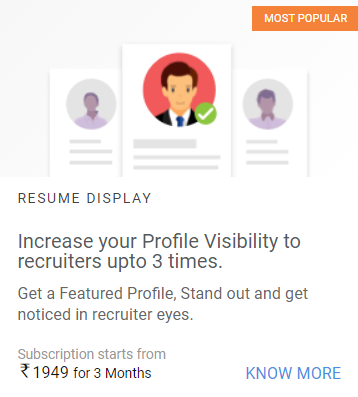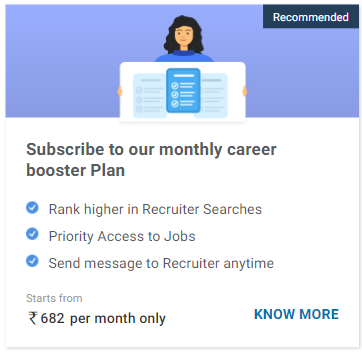In this guide, we present a few tips and techniques that will help you in building a better resume
CVs should have 5 primary sections:
- Contact details
- Personal Summary
- Education and qualifications
- Experience and employment history
- Skills (technical and non-technical)
Contact details
Mention your name, age and contact details including email & number so recruiters can reach you. If you do not want to share your home address address, you can instead write your neighborhood and city so recruiters know how far you would be commuting
Personal summary
Highlight why you are well qualified for the job in two to four sentences.
Freshers: Explain your career plans and the skills you have gained to achieve your goals.
Experienced professionals: List your strengths and most impressive achievement
Education and qualifications
List your education details starting with the highest or most recent accomplishments. Include the degree, specialization, year graduated, and name of the institution.
Experience and employment history
This is arguably the most important sections of your resume.
Junior applicants: Use this section to list other professional experiences like internships, freelance work, volunteer work and even extracurricular activities that display valuable skills.
Experienced professionals: List your jobs in reverse chronological order (starting with the most recent). For each job, add key responsibilities & achievements. Though you may have done many projects, choose only those that require similar skills as the job for which you are applying.
Skills section
List 5-10 of your strongest skills for the job. Depending on your background and the job you are applying for, you can split the skills section into different parts – technical, coding, software, management, personal, sales etc. Always to start with your strongest skills
Once you have all the sections prepared, here are a few tips on how to make an effective resume:
- Length of the resume: Recruiters have to read dozens of CVs in a day. Finding the right information should be quick and easy for them.
Juniors: Limit length to 1 page
Experienced professionals: Upto 2 pages. If you want to include details on a lot of relevant projects and it isn’t fitting in 2 pages, you can add an annexure at the end of your resume, listing all the projects your worked on.
- False/Irrelevant information: Never lie in a CV – you are likely to get caught during your interviews, or even worse – after you’re hired.
- Presentation: The final resume should look neat and well formatted including even spacing, uniform font style and size for similar kind of content.
- Grammar: The resume is your first impression, and recruiters expect a perfect document. Full stops, commas, semi colons and correct spellings as absolutely critical.
- Objective: The very first section of the resume i.e. the summary should be very specific and should demonstrate exactly the skill you carry, functional area you have specialized in, industry you have been exposed to and what you will be offering as a professional to the organization you are seeking opportunity in. A vague objective would not be a good start
- Action verb: Action verbs like spearheading, executing, performing should not be repeated in a resume, specifically in the key result areas of the respective organizations.
Get Shortlisted:Drafting a customized resume will put you ahead of the other applicants. Now go ahead, make a list and create an impressive resume! If you find it difficult to weave your success stories on the resume try availing resume writing service from Naukri.com who specialize in writing resumes and give that extra edge. Click here to know more




